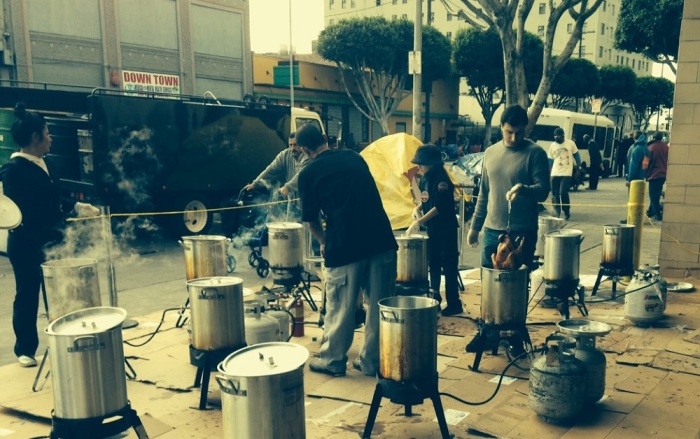Los Angeles Considers Ordinance Banning the Feeding of City's Growing Homeless Population

The Los Angeles City Council is considering a ban on the feeding of homeless people in public spaces even as the city's homeless population has dramatically defied a national decline.
The county's homeless population stands at 57,737, a 15 percent increase from 2011 to 2013, reports the Department of Housing and Urban Development. As the population moves into areas like West Hollywood, Venice and Brentwood, it has frustrated homeowners and led two city council members, Tom LaBonge and Mitch O'Farrell, to introduce a resolution that would ban outdoor feeding.
But even while the rest of the city grapples with the influx of homeless people, the majority of them are still concentrated in the Los Angeles neighborhood of Skid Row. Back in the 1970s, the city decided to intentionally concentrate homeless and drug addiction services like missions, shelters and recovery centers in the neighborhood in downtown Los Angeles.
Andy Bales, the CEO of the Union Rescue Mission, a Christian nonprofit organization that has been serving the Skid Row community since 1891, described the 49-square block area as "like nothing else in the entire U.S."
"It is probably the biggest manmade disaster in the U.S. to plan it that way," Bales told The Christian Post. "Though we've had efforts since then to deconstruct it and move it outside, I guess the neighbors in the surrounding areas do not want to have services in the area, so now the folks are caught in the 'twilight zone' of Skid Row."
Roughly 2,000 people live on the street, said Bales, as well as the hundreds that live in the shelters and low-rent hotels.
According to Bales, the majority of the existing services would not be among those affected by an outdoor feeding ban. Instead, many are groups coming from outside the neighborhood or city and enter Skid Row with "day-old Krispy Kreme doughnuts" or "barbequed chicken" independently, not partnering their efforts with those of existing missions.
Deon Joseph, an officer with the Los Angeles Police Department who has worked in Skid Row for 16 out of his 18 years in the field, is critical of the impact of these efforts.
In a Facebook post earlier this year, Joseph wrote to would-be outdoor feeders, "When you feed [homeless people] in the street, you unintentionally rob them of any incentive to change, cause them to eat in a filthy environment, which many of them contribute to as they eat what they like, and throw the rest into the street. This is why you see the unhealthy conditions that the homeless in Skid Row live in."
"You must understand that when you feed the homeless in the street, you unintentionally rob them of any incentive to seek assistance from the various services in the area," he added.
In his experience, Bales said the other problem the groups cause is they do not build long-term relationships with individuals, often duplicating existing feeding services but undermining some of the longer-term efforts of the organizations.
"I think what people don't realize is that there's probably plenty of food being fed on Skid Row and that folks should connect with a mission that has a food program," said Bales.
For instance, Bales' own group uses its feeding program to encourage people to join a year-long Christian-based recovery program to help participants work through anger problems, drug addiction and establish a relationship with God.
Some of the incentive for change is lost, he says, when people just receive food on the street.
Yet Bales also said that given the increase of homelessness in Los Angeles County, he would not suggest banning outdoor eating, which he admits his organization participates in when it cooks more than 100 turkeys during the holiday season. Instead, Bales wants to push for more effective cooperation between the existing and visiting groups.
"There are so many people on the street that I would not want to inhibit any feeding of people who are desperate who may not be anywhere near where services are available," said Bales, admitting that he used to go out weekly to feed the homeless.
"I'd hate for folks who are [feeding outside] in a smart way, connecting people to services, I'd hate for them to have a restriction on being able to feed," he added.
Joseph suggested that individuals seeking to help Skid Row's homeless population pass out hygiene kits or bottled water. At a larger level, he said, if other cities in Los Angeles County built shelters, it would help decrease the density of homelessness in the neighborhood and could help mitigate issues like crime and violence.
The officer, a "born-again Christian," said that he wanted to be clear that he is not trying to discourage individuals from coming out to Skid Row, but wants them to be aware of the nuances and challenges of solving homelessness and transforming lives, and that it's more than "throwing food and clothes at the homeless."
"[Outdoor feeding] at Skid Row just seems to be the easy thing to do. Let's look throughout history, because any noble thing was hard," Joseph told CP.
"People want to come down and do good, but they drive off and what they don't realize is that they are a part, both indirectly and directly, of worsening the quality of life and furthering the crime when they leave. A sandwich has never changed anyone's life in Skid Row," said Joseph.




























